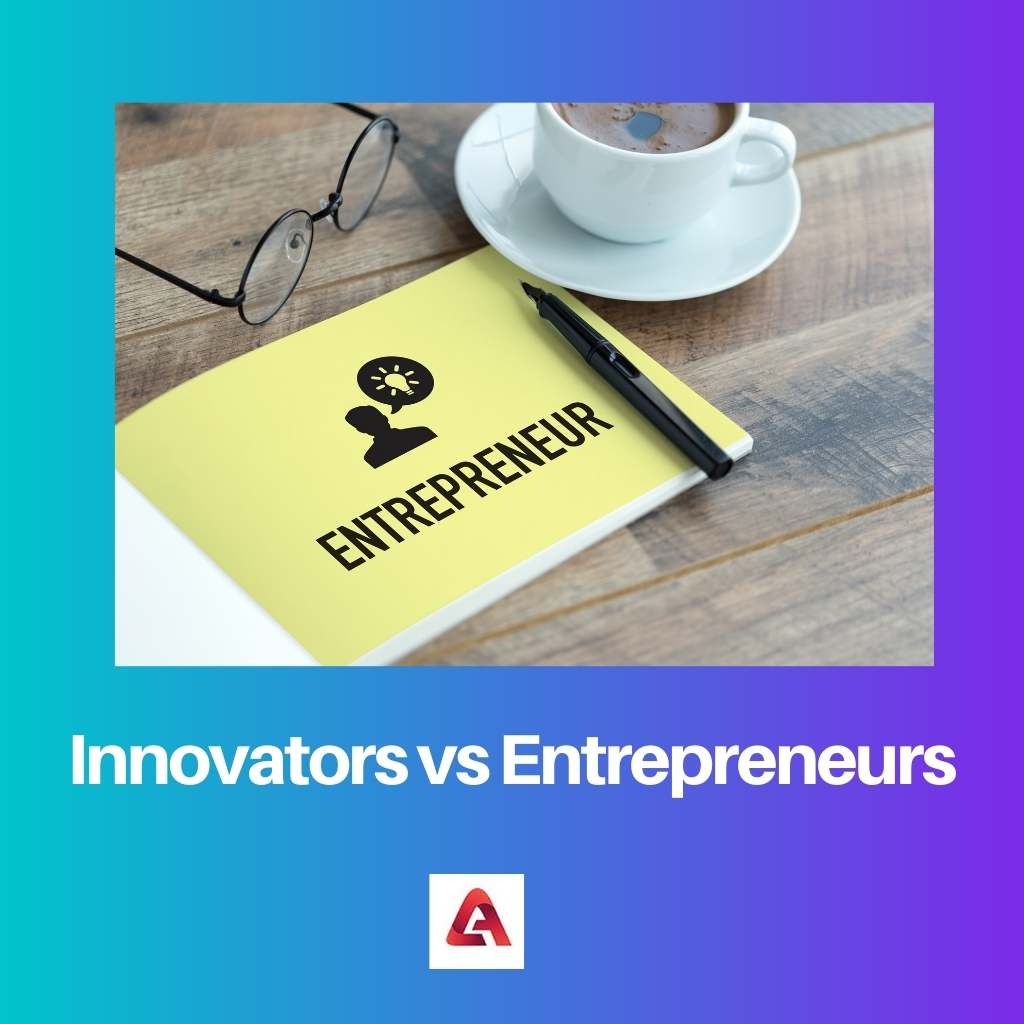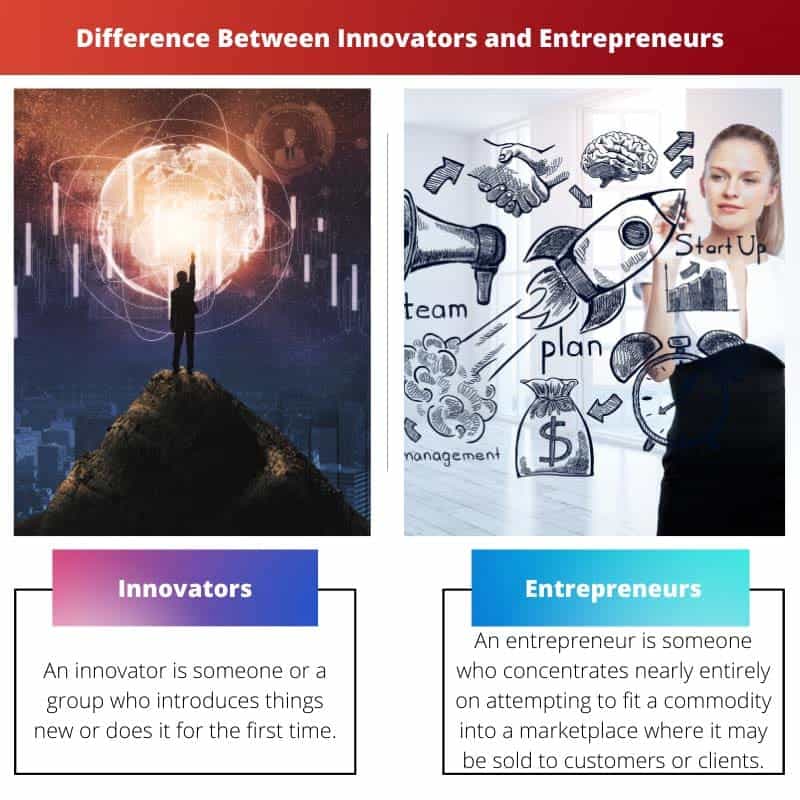The contemporary world produces a perfect environment for entrepreneurship and innovation. It has resulted in the development of a wide range of businesses, services, and even occupations.
Although there is a connection between an innovator and an entrepreneur, they are not always the same entity or have the same concept. As a result, it’s critical to differentiate between the two.
Key Takeaways
- Innovators create new ideas and concepts, while entrepreneurs establish businesses based on these ideas.
- Innovators focus on invention and originality, whereas entrepreneurs emphasize execution and market implementation.
- Innovators may not necessarily commercialize their ideas, but entrepreneurs develop ventures to capitalize on market opportunities.
Innovators vs Entrepreneurs
Innovators are individuals who introduce novel ideas, products, or processes to the market and focus on creating new solutions to problems. Entrepreneurs are individuals who create and manage new ventures to capitalize on those innovations, focusing on bringing those solutions to market.

An innovator is someone or a group who introduces new things or does it for the first time. In most circumstances, an innovator is not attempting to commercialize his or her creation.
Between him and an entrepreneur, an innovator is most likely the most imaginative. They will make an effort to improve on a product that is currently on the market.
An entrepreneur is someone who concentrates nearly entirely on attempting to fit a commodity into a marketplace where it may be sold to customers or clients.
Entrepreneurs frequently build businesses around the product they wish to put on the market, which is why most people who start businesses are considered entrepreneurs.
Comparison Table
| Parameters of Comparison | Innovators | Entrepreneurs |
|---|---|---|
| Function | Introducing new ideas | Converting ideas into business opportunities |
| Required Skills | Creative thinking is an experimental skill | Leadership, managerial, and planning skills |
| Risk Involved | This job requires very less or no risk at all | This job involves a lot of risks |
| Relation with the concept | Relationship with an idea is short term as they may move onto another idea | Relationship with an idea is long term as they have to build a business and manage it |
| Co-relation | Every innovator is not an entrepreneur | Every entrepreneur can be an innovator |
What are Innovators?
An innovator is somebody who is capable of acquiring new knowledge and skills. It could take larger or smaller forms, but it all boils down to bringing about some significant positive change.
They recognize and act on opportunities for improvement. Most company executives believe that innovation is essential to a successful strategic plan.
To be innovative, you must do things in a different way or in ways that have never been done before.
An innovator is someone who has acknowledged this notion and developed conditions where people are given the resources and expertise they need to challenge the status quo, broaden the scope, and thrive.
Innovators are legitimate pioneers committed to implementing vibrant, highly competent, and value systems organizations that employ passionate people regarding their tasks, offer additional opportunities for advancement, contribute to making them feel appreciated and valued, and provide clear understanding concerning their responsibilities and roles.
An innovator comprehends that innovation does not occur in a vacuum. Individuals benefit, establish and maintain active, vibrant communities of friends, assets, and organizations.
They see collaboration as an attempt to identify strengths, weak points, possibilities, and dangers rather than a challenge.
They recognize that innovation is a continuous process that requires businesses to go far beyond what they have actually accomplished in order to stay profitable.
This implies that innovators are effective change agents who understand how to deal with opposing parties to their concepts.

What are Entrepreneurs?
An entrepreneur is a creative pioneer who takes charge of transforming ideas into economically viable advancements, entities, or enterprises while taking on greater-than-usual financial risks in the process.
An entrepreneur is someone who generates new ideas, products, businesses, or proposals.
They are the start of a new initiative, project, or business. He is the one who decides to expand on an idea and make it more than just a conceptual model.
A venture’s backbone is the entrepreneur. He is the one who bears the responsibility for the venture’s success or failure from the start, and he is in charge of the venture’s economic expansion speed and direction.
They will generate ideas and turn them into valuable innovations, entities, or businesses. He determines the best path for the idea to take and nurtures it until it matures into something beneficial.
The entrepreneur has the most invested in the venture, both emotionally and financially. He bears the ultimate responsibility for the venture’s success or failure. As a result, his job is more dangerous than most.
Entrepreneurs are self-motivated individuals who have a strong desire to open innovation and create. They have a strong belief in themselves and their ideas, which keeps them afloat in the face of adversity.

Main Differences Between Innovators and Entrepreneurs
- An innovator introduces new ideas for development, whereas an entrepreneur converts those ideas into business opportunities.
- An innovator must have creative thinking and experimental skills, whereas an entrepreneur must have leadership and managerial skills.
- An innovator’s job involves less risk, but the job of an entrepreneur involves a lot of risk.
- An innovator has a short-term relationship with the particular idea, but an entrepreneur has a longer relationship because they further build a business around the idea.
- Every innovator can’t be an entrepreneur, although every entrepreneur can be an innovator.

- https://link.springer.com/article/10.1007/s10961-006-9060-5
- https://www.sciencedirect.com/science/article/pii/0167268185900125

This comparison between innovators and entrepreneurs is really enlightening. It’s great to understand the nuances of these roles.
The article is compelling and provides a comprehensive overview of what it means to be an innovator versus an entrepreneur.
The detailed description of what an innovator and entrepreneur are and their main differences is valuable. It contributes to a deeper understanding of the functions and roles in business.
This article has perfectly summed up the differences between innovators and entrepreneurs. It is quite informative and thorough.
The article describes the roles of innovators and entreprenuers well, though it could delve deeper into the inherent socio-economic factors involved in each role.
That’s a fair point. Further exploration into the societal impact of innovators and entrepreneurs would be beneficial.
I agree. A more in-depth analysis could add more value to the article.
The comparison table is really helpful. It provides a clear distinction between the functions and skills required for both roles.